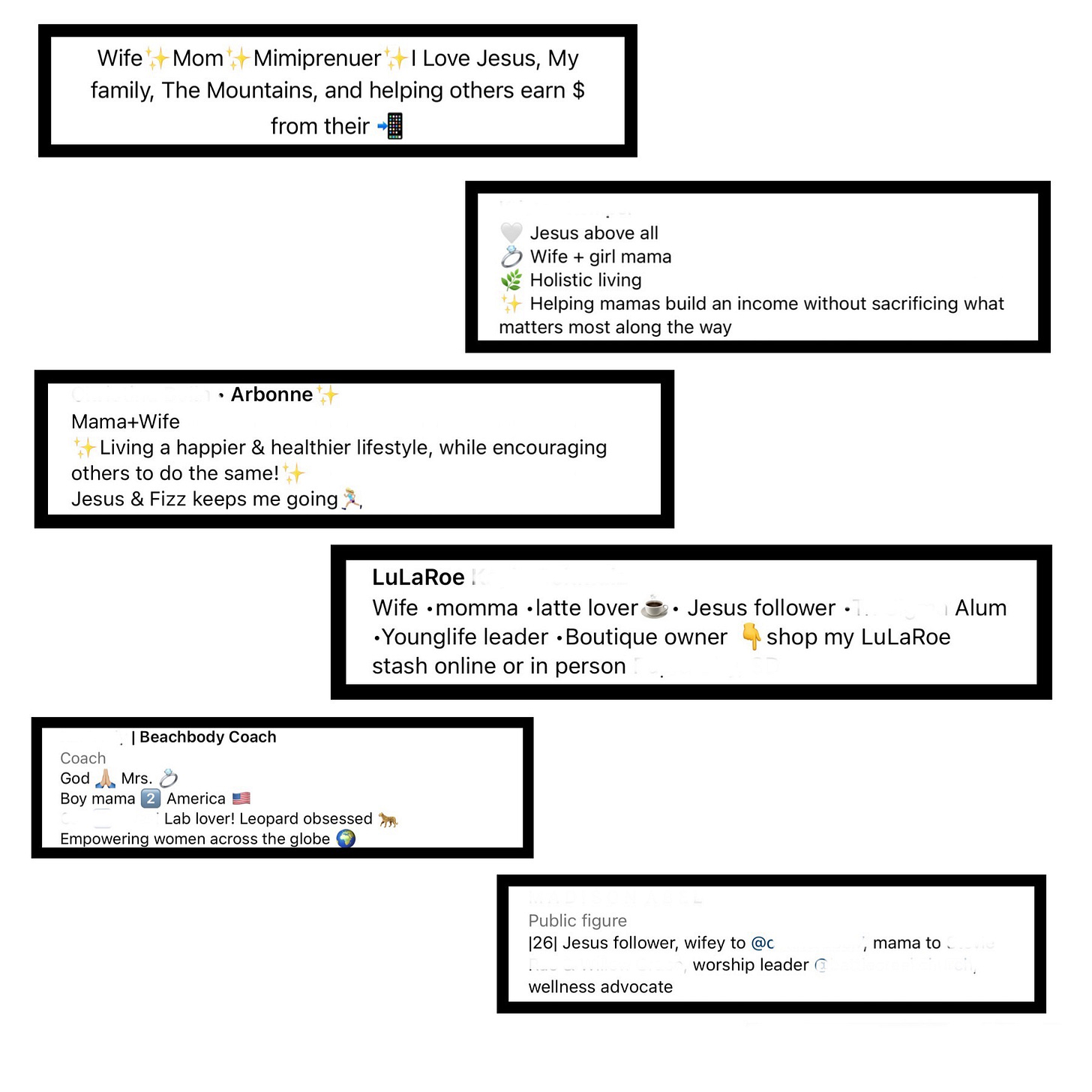Grifter documentaries are really big right now. There’s Inventing Anna, Bad Vegan, and The Tinder Swindler just on Netflix alone. Grifter storhave always intrigued me (they clearly intrigue a lot of people). I’ve also always been interested in cults and MLMs, and the similarities between them. Something I noticed years ago was the overwhelming amount of white women who would join these spaces. This piqued my interest even more.
Since the pandemic began, I’ve seen more and more white women on social media advertising for their MLM (Multi-level Marketing) company. It feels a bit like a never-ending QVC show. These women all say the same things:
“You NEED this in your life.”
“I get paid several times a day!”
“I get to work on my phone from anywhere!”
“This company is seriously the best!”
“It’s not about the money; it’s about the people.”
“I have the best team. You should join.”
WTF is an MLM?
“MLM” stands for Multi-level Marketing. It has recently be rebranded as “Network Marketing” or “Social Retail.” From Wikipedia:
…a controversial marketing strategy for the sale of products or services where the revenue of the MLM company is derived from a non-salaried workforce selling the company's products or services, while the earnings of the participants are derived from a pyramid-shaped or binary compensation commission system. An MLM strategy may be an illegal pyramid scheme.
Think about your mother or grandmother who may have sold Mary Kay or Avon back in the day. Historically, women have been the prime audience of MLM companies because the products were always very gendered and sold explicitly to them. In some ways, these companies helped women who worked in the home be able to do other types of work and have their own personal income.
Examples of MLMs include: Amway, Beachbody, LuLaRoe, Modere, Monat, and YoungLiving. According to this very organized (and updated!) list, there are currently 656 active MLMs.
These companies sell people a fantasy of friendship, community, wealth, and the “American Dream” of hyper individualism. If we didn’t live in a late-state capitalist nightmare, MLMs could not exist.
More about how compensation works from Wikipedia:
…the compensation plan usually pays out to participants from two potential revenue streams. The first is based on a sales commission from directly selling the product or service; the second is paid out from commissions based upon the wholesale purchases made by other sellers whom the participant has recruited to also sell product. In the organizational hierarchy of MLM companies, recruited participants (as well as those whom the recruit recruits) are referred to as one's downline distributors.
This would all be fine (I guess) if people weren’t lied to about how much money they will make (or that they will make any money). Reporter Stephanie Asymkos writes:
Experts are quick to point out that both structures are inherently flawed because it’s based on a model that’s mathematically impossible. If each recruit were to recruit five people and those five people were to recruit five people each, that chain would eclipse the world’s population after 13 cycles.
One of the main critiques of MLMs is that the majority of people working for them are not the ones making a ton of money. According to the Federal Trade Commission (FTC): “Most people who join legitimate MLMs make little or no money. Some of them lose money. In some cases, people believe they’ve joined a legitimate MLM, but it turns out to be an illegal pyramid scheme that steals everything they invest and leaves them deeply in debt.” Many of these MLMs have had lawsuits lodged against them as well, which doesn’t exactly bode well.
99% of people in MLMs never make any money and actually end up losing money. Why is this percentage so high? According to Amanda Montell for Bustle:
…all that recruiting, recruiting, recruiting floods the market with too many boss babes; so you wind up with a tiny gaggle of lucky super-sellers who got in early at the top of the pyramid, profiting only at the expense of the screwed-over mass below them.
These “Boss Babes” all say some variation of “Support a woman’s small business!” As if working for a multi-billion dollar company is a “small business.” As if supporting someone working for an MLM is better and more ethical than buying something from Amazon (both are terrible, IMO). I’m all for supporting women, but I’m not here to support mis/disinformation or predatory business practices. If you watched the LuLaRoe documentary, you would know that MLMs tend to prey on women who work in the home, typically mothers, who, due to being the sole childcare, are unable to get jobs outside of the home. I’m not saying these women don’t have agency. I’m saying they often don’t have options. Also, they badly want to belong to something.
Another thing I’ve noticed about these mostly white, middle-to-upper class cishet blonde women is that they are super into Jesus. Now, as a very far-left individual, whenever I see “Jesus lover” or “Forever Worshipper,” I kind of want to run and hide. It has been my experience that the people who have these types of things in their Instagram bios are conservative bigots. The identities these women choose to put in their bios brings me back to a time I’m thankful to not have been living: the 1950s. It’s always, “Jesus first” (or some iteration of that), followed by “Wife,” and finally, “Mother.” I am not a wife or mother, but if I was it’s difficult for me to think that these specific identities would be the things I call most attention to in a bio. Why is the identity of “Wife,” specifically, so important?
Identities are important to everyone to some degree. Some identities we choose, some we don’t. Some we think we choose when actually they’re placed on us. Part of claiming our identities, and us choosing to claim certain identities, comes from wanting to feel/be included in something bigger than ourselves. Many women join MLMs precisely because they want to feel a part of something. Many women join cults for the same reason.
WTF is a Cult?
According to Wikipedia, a cult is:
a social group that is defined by its unusual religious, spiritual, or philosophical beliefs, or its common interest in a particular personality, object, or goal. This sense of the term is controversial, having divergent definitions both in popular culture and academia, and has also been an ongoing source of contention among scholars across several fields of study. The word "cult" is usually considered pejorative.
I’m a bit of an armchair-expert in cults since I’ve been fascinated by them for years. I’ve watched pretty much all the cult documentaries out there. I’ve read various articles on cults and how they came to be.
Examples of cults: QAnon, Manson Family, Heaven’s Gate, NXIVM, Children of God, and more, of course.
The Wikipedia definition almost makes it sound like anything involving a group of like-minded people can be a cult. Obviously this isn’t the case. There are specific tactics and practices used, which I’ll discuss later.
In the past several years, social media has helped further cult doctrine. Zoë Heller writes:
The silos of political groupthink created by social media have turned out to be ideal settings for the germination and dissemination of extremist ideas and alternative realities. To date, the most significant and frightening cultic phenomenon to arise from social media is QAnon.
Cults terrify and interest me. And the connection between them and MLMs is concerning.
Similarities Between MLMs and Cults
When we talk about MLMs being similar to cults, I’m not saying they all are; I’m saying many of them have, at the very least, cult tendencies. According to cult expert, Steven A. Hassan PhD for Psychology Today:
Most MLMs use tactics of recruitment, financial manipulation, and the promise of large profits. But, like all cults, they employ thought control, magical thinking, thought-stopping, and self-blame. Failures are blamed directly on the consultants, for lack of hard work or competence. The group has no accountability, and the leaders do not allow questions or criticism.
If you’re not one of the few people making 6+ figures selling your shampoo or skincare, it becomes your fault. It becomes, “Well, I guess you aren’t working hard enough.” Hassan continues:
Social aspects of recruitment often involve large seminars or other types of scripted events. Successful distributors—they are a very small minority—present their inspiring rags-to-riches stories. Couples may appear together; the husband talking proudly about providing for his family, his wife swearing their marriage has become so much more fun and loving.
Similar to a person in a cult, if you even question something in your MLM, you are potentially subjected to emotional manipulation and ostracization from your “team” or community. Many people who try to leave cults and MLMs have difficulty doing so, usually because of manipulation and mind control. The people who do end up leaving either a cult or an MLM have similar feelings of guilt and shame.
To show the similarities between cults and MLMs, Hassan created the BITE model, which includes the following tactics:
Behavior Control
Information Control
Thought Control
Emotional Control
Why Do White Women Join Cults/MLMs?
Then, what is the appeal of MLMs and cults? Why do, specifically, white women join them? For The New Yorker, Zoë Heller writes:
Some scholars theorize that levels of religiosity and cultic affiliation tend to rise in proportion to the perceived uncertainty of an environment. The less control we feel we have over our circumstances, the more likely we are to entrust our fates to a higher power.
Perhaps this is why more women have joined MLMs since the pandemic began. Everyone is searching for stability and control right now.
So, why are women the primary joiners in both MLMs and cults? Some say it’s because women are more susceptible due to historical and present exploitation, sexism and misogyny. For why women join MLMs, I think it also has to do with a very specific brand of Christianity. The overtones of religion are hard to miss, which is interesting, because most salespeople are careful to state anything about their beliefs since they don’t want to ostracize any potential buyer. But it would appear that for most of these white Christian women, they are only interested in selling to those similar to them (in faith, race, and gender).
Why do white women specifically seem to join cults and MLMs? I think it has to do with various things. Take the cult, NXIVM for example. A white man, Keith Raniere was at the top and various white women were below him. This specific cult reminds me a bit of the phenomenon that white women will often align themselves with their race first and their gender second. White women have a tendency to do whatever thing is adjacent to white men. It’s important to note that the majority of sellers/buyers in MLMs are women (and white), while the majority of CEOs are men (and white).
Due to the long ago conscious/unconscious decision of white women aligning themselves with white men and, overall, whiteness, white women are chronically seeking community. And perhaps consciously or unconsciously seek this, specifically, with other white women. I don’t doubt that some of this is related to racism. I think it’s also related to the fact that white women don’t have a culture, and in some ways bond with each other because of this lack of culture. Sure, we may be part this and part that, but most of are so far removed from these ethnic cultures that we can’t truly say we belong to them.
This doesn’t give white women who join cults/MLMs an excuse. It also doesn’t mean they don’t have choice, agency, or autonomy. Nobody joins a cult on purpose. Though many people do join MLMs on purpose, they still may not realize just how predatory these companies are until it’s too late. White women can be both victims and harm-doers, and not knowing that they are causing harm does not absolve them.
MLMs and cults are perfect for these people, because often the companies/groups brand themselves as self-helpy, feel-good, connected communities. Cults and MLMs prey on white women who want to do better in a heteronormative, “bootstrap” capitalist way. They prey on white women who want to belong to something so badly that they are willing to lose themselves over and over again.
Cult/MLM Documentaries










Love this, I also got into all those docs throughout the pandemic and your explanation is so spot on. My favorite is the caption "Jesus was an anti-capitalist so this is awkward..." So fascinating, thank you for sharing!
So interesting!!